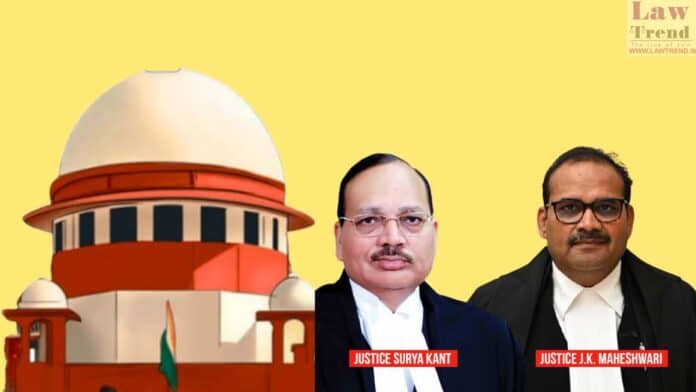The Supreme Court on Friday transferred the trial in a murder case of a TMC leader pending in a court in Purba Medinipur in West Bengal to Kolkata, observing that the state took a “complete U-turn” to help the main accused and went to the extent of “resorting to its powers” to withdraw the prosecution.
The apex court directed that trial in the case shall be conducted by the chief judge of the city sessions court, and he shall endeavour to take up the trial on a weekly basis and make an effort to conclude it within six months.
A bench of justices Surya Kant and J K Maheshwari directed the state to ensure that no harm is caused to the life and liberty of the witnesses and no direct or indirect attempt is made by the accused persons in the case to influence or threaten them.

The top court delivered its verdict on a plea filed by the brother of the deceased Kurban Sha, who was alleged to have been shot when he was working in the office of a political party in October 2019, seeking transfer of the trial from the court in Purba Medinipur to a competent court in Assam primarily on the ground that a fair trial would not be possible in West Bengal.
It noted that the procedure followed in the case was “completely alien” to the scheme of section 321 of the Code of Criminal Procedure (CrPC), which deals with withdrawal from prosecution, as the decision to withdraw prosecution was taken at the level of the state government and the public prosecutor was merely asked to act upon the said government notification.
The bench also noted that the link judge of the trial court had shown “tearing hurry” in accepting the application of the public prosecutor and permitting withdrawal from prosecution even before the date when the case was listed for prosecution evidence.
It said none of these “patent illegalities” were allowed to sustain as a result of the “pro -active exercise” of the jurisdiction by the Calcutta High Court and not only was the state government’s notification was set aside, the order passed by the link judge permitting such withdrawal was also annulled by the high court.
“Adverting to the facts of the case in hand in light of the principles enunciated by this court from time to time, it is true that the State of West Bengal has taken a complete U- turn with a view to help the main accused, namely, respondent no. 2 and it went to the extent of resorting to its powers under section 321 of CrPC to withdraw the prosecution itself,” the bench said.
The apex court said a plain reading of section 321 of the CrPC leaves no room to doubt that it is the public prosecutor in- charge of the case who has to apply his mind independently and impartially to form a view for withdrawal from the prosecution with the consent of the court.
The bench said there is no legal necessity to transfer the trial outside the state of West Bengal and the apprehensions of the petitioner, some of which are indeed genuine, can be effectively redressed by issuing appropriate directions.
“We say so for the reason that more than 90 witnesses, most of whom are Bengali speaking, are yet to be examined. The transfer of trial to any other neighbouring state will cause serious impediment in the deposition of those witnesses and some of them might be reluctant to travel to a far away place and, thus, the case of the prosecution will be severely prejudiced,” it said.
The apex court said so long as the high court and district judiciary are ensuring the fairness in trial proceedings within their jurisdictional framework, “we are not inclined to accept that the victim’s family will not get fair justice, if the trial is held in the state of West Bengal”.
It observed that power of transfer under section 406 of the CrPC is to be “exercised sparingly and only when justice is apparently in grave peril”.
The bench directed that trial be transferred from the court at Purba Medinipur to the court of chief judge, city sessions court, Calcutta.
“The trial shall be conducted by the chief judge, city sessions court and he shall not entrust the case to any other additional sessions judge,” it said, adding, “The state of West Bengal is directed to appoint a special public prosecutor on the recommendations of the chief judge, city sessions court, Calcutta with the prior approval of the high court. This exercise shall be completed within two weeks.”
It directed that wife of the deceased and other crucial prosecution witnesses shall be provided adequate security.
The bench said the de- facto complainant, who is also stated to be the eye-witness and has allegedly resiled from his version recorded during the examination- in- chief, shall be subjected to cross-examination by the special public prosecutor, for which the advocate engaged by the petitioner may provide assistance to the special public prosecutor.
It said the accused, who are in custody, shall be transferred forthwith to the central jail in Kolkata.
The top court said the accused, who are in custody, shall not be enlarged on bail till the conclusion of the trial save and except by the high court.







